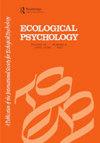非人类自组织集体中的行动协调:生活系统和非生活系统的多学科经验教训
IF 1.7
3区 心理学
Q3 PSYCHOLOGY, EXPERIMENTAL
引用次数: 1
摘要
摘要尽管在过去的几十年里,人际协调、集体智能和自组织一直是人类社会互动研究的基础,但这些现象在非人类系统中也有着丰富的历史。本特刊旨在联合研究共享对话中实体间行动协调的学科。在这里,我们汇集了生态心理学家、生态学家、生物学家、神经行为学家和化学家,他们都致力于理解群体协调的基本原理。我们认为,这些不同视角之间的接触对于继续将生态视角的影响扩大到其他领域至关重要。虽然这本多学科特刊对集体行为采取了明确的非人类观点,但我们希望它不仅能提高我们对实体间动力学的基本理解,还能激发好奇心,激发人类集体研究的新方法。本文章由计算机程序翻译,如有差异,请以英文原文为准。
Action Coordination in Non-Human Self-Organizing Collectives: Multidisciplinary Lessons From Living and Nonliving Systems
Abstract While interpersonal coordination, collective intelligence, and self-organization have been fundamental in the study of human social interaction over the past several decades, these phenomena have a rich history in non-human systems as well. This special issue aims to unite disciplines studying inter-entity coordination of action in shared conversation. Here, we bring together ecological psychologists, ecologists, biologists, neuroethologists, and chemists, all working toward understanding the fundamentals of group coordination. We believe that contact among these different perspectives is essential for continuing to expand the impact of the ecological perspective to other fields. While this multidisciplinary special issue takes an explicitly non-human view of collective behavior, we hope it will not only improve our basic understanding of inter-entity dynamics but also spark curiosity and inspire new approaches in the study of human collectives.
求助全文
通过发布文献求助,成功后即可免费获取论文全文。
去求助
来源期刊

Ecological Psychology
PSYCHOLOGY, EXPERIMENTAL-
CiteScore
3.30
自引率
10.50%
发文量
8
期刊介绍:
This unique journal publishes original articles that contribute to the understanding of psychological and behavioral processes as they occur within the ecological constraints of animal-environment systems. It focuses on problems of perception, action, cognition, communication, learning, development, and evolution in all species, to the extent that those problems derive from a consideration of whole animal-environment systems, rather than animals or their environments in isolation from each other. Significant contributions may come from such diverse fields as human experimental psychology, developmental/social psychology, animal behavior, human factors, fine arts, communication, computer science, philosophy, physical education and therapy, speech and hearing, and vision research.
 求助内容:
求助内容: 应助结果提醒方式:
应助结果提醒方式:


